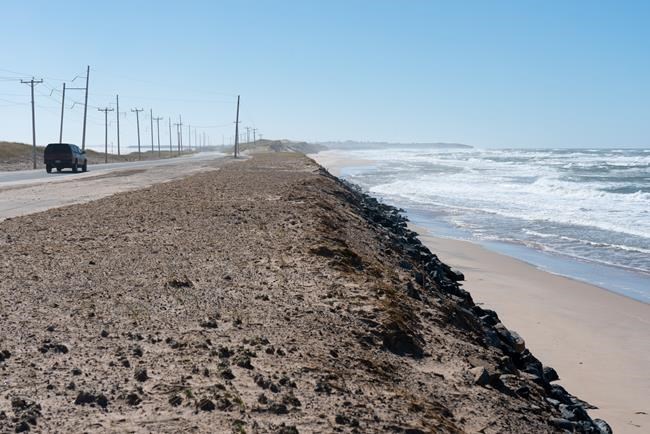MONTREAL — A team of divers combing the watery depths off Quebec's Îles-de-la-Madeleine this summer say they have discovered seven new shipwrecks that likely date to the 1800s.
Diver Jean-Simon Richard, president of a local archeology and natural history museum — Musée des Îles de la Madeleine — says he and two other divers made the discoveries between May and July. Richard said he's found no reports documenting the sites of the shipwrecks, suggesting they have been "lost to memory" for decades, if not since the vessels sank.
"It's always a special feeling to dive a shipwreck, knowing we might be the first people to see that ship in 150 years," he said.
Five of the seven wrecks appear to be small schooners about 40 feet or 50 feet long, while the two others, both about 130 feet long, could have higher archeological value, Richard said.
He said hundreds of ships are believed to have sank in the Gulf of St. Lawrence near the Îles-de-la-Madeleine — an archipelago of 12 islands located between Prince Edward Island and Newfoundland — but most of their final resting places remain a mystery. Finding even one new shipwreck in a year is big news — let alone seven, he added.
About 30 shipwrecks had been located in the region before the seven new discoveries, he said, adding, "these are from years of fishing and searching by a lot of people."
"Seven in just a couple months, it's really an extraordinary find."
One theory posits that changing ocean currents and severe storms, such as post-tropical storm Fiona last year, may have swept away the sand that had kept shipwrecks hidden, Richard said. However, the ocean floor is "vast" and it's possible the wrecks simply hadn't been spotted, he added.
Richard said his team discovered the wrecks by searching parts of the gulf where they thought sunken vessels could be found, sometimes based on information given to them from fishermen who noticed unusual patterns on the ocean floor.
He said the ships appear to be made of wood and are secured with brass nails, and with copper protecting the hull — all clues they date to the 1800s. Some of the smaller ships were found in the same area, suggesting they might have sank at the same time during a storm, such as the August Gale hurricane of 1873 that is believed to have drowned some 60 ships, he explained.
Richard said the museum will report the findings to the federal government's Receivers of Wreck — employees of the Transport Department who act as custodians of wreckages whose owners aren't known — and to Quebec's Culture Department. He said he hopes the federal or provincial government will agree to send underwater archeologists down to learn more about the bigger ships and possibly identify them.
He said his museum, which doesn't have a permanent address, will add details about the shipwrecks to the exhibits it displays. While the divers haven't touched the shipwrecks, they took photos and videos of them.
Rob Rondeau, a marine archeologist as well as a sessional instructor and PhD student at Simon Fraser University, said shipwrecks were quite common prior to the 20th century, when navigational tools improved. Island chains such as the Îles-de-la-Madeleine, with their reefs and currents, presented perils that spelled tragedy for many vessels, especially on a busy shipping route such as the Gulf of St. Lawrence, he said.
While the final location of many shipwrecks remains unknown, he says the pace of discovery has increased in recent years. "It seems like I'm hearing about a new shipwreck almost weekly, whereas that wasn't the case five or 10 years ago," he said in a phone interview.
It's very likely that shifting weather patterns, including severe storms, are contributing to revealing new wrecks, Rondeau said.
However, he said, improved technology, including scuba gear, sonar and cameras, are also playing a big role, as is the increased public and professional interest in searching for them.
This report by The Canadian Press was first published Aug. 1, 2023.
Morgan Lowrie, The Canadian Press



